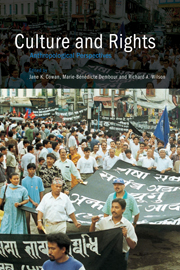Part I - Setting universal rights
Published online by Cambridge University Press: 05 June 2012
Summary
There was a time in anthropology when cultural relativism was advocated as a means to counteract the negative effects brought about by the imposition of universal rights. However, demanding that ‘culture’ be respected is misleading, since the kind of bounded culture implied in such a formulation simply does not exist. What is more, the universal rights implied in the same formulation do not exist either, in the sense that rights, including so-called universal ones, are not natural and eternal but always emergent and historically specific. What is needed, therefore, are more sophisticated views of both relativism and universalism, but also of the relationship between these two moral positions. The five chapters included in the first part of this volume call for an empirical and/or theoretical reassessment of the dichotomy traditionally posited between relativism and universalism.
The first four contributions examine the relationship between ostensibly universal rules and abhorrent, or at least discouraged, practices: domestic violence against women, female genital mutilation, child prostitution, and customary marriage. These classic cases, examined in the respective national contexts of the US state of Hawai'i, France, Thailand and Botswana, are considered by most commentators to be emblematic of the opposition between universalism and relativism. The authors, however, offer a different reading. On the one hand, they reject the idea of a stark opposition between the two poles of universalism and relativism. On the other hand, they call for attentiveness to empirical needs that are discovered through dialogue rather than posited in an abstract and essentialized way.
- Type
- Chapter
- Information
- Culture and RightsAnthropological Perspectives, pp. 27 - 30Publisher: Cambridge University PressPrint publication year: 2001

